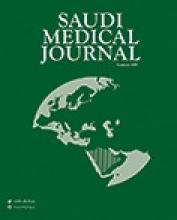To the Editor
We read with interest the comprehensive review on rheumatoid arthritis (RA) in the kingdom of Saudi Arabia (KSA) by Almoallim and Alharbi.1 We would like to make a few comments.
The best predictors for the development of RA, are anti-citrullinated protein antibodies (ACPA) and rheumatoid factors (RF), which can appear more than 10 years before clinical arthritis.2 Screening using ACPA and RF are a cost effective method for identifying the population susceptible to RA. Though susceptibility to RA is clearly defined by a pattern of inherited genes, the overall contribution of genetics to the development of the disease is very small at around 15%.3 The best defined environmental factor is smoking. Its interaction with genes increases susceptibility to RA 20- to 40-fold.4 Smoking increases citrullination in alveolar macrophages. However, citrullination of peptides in the lung is not specific for RA. In the United Kingdom (UK), the introduction of the gait, arms, legs, and spine (GALS) screening examination represents a major advance for undergraduate education by enabling medical students to perform a validated, straightforward musculoskeletal examination. The video and the details of this simple screening test is available free from Arthritis Research, UK on http://www.arthritisresearchuk.org/health-professionals-and-students/video-resources/rems/gals-screening-examination.aspx.5 The GALS is an objective and a quick screen for both locomotor abnormality and functional disability.6 Our final point, there are many excellent international guidelines for the treatment of RA, but more importantly is whether practicing clinicians adhere to them. Maintaining a high standard of care for our patients with RA, requires a national or regional audit.
Reply from the Author
We read with pleasure the comments by Merashli et al on our recent publication “Rheumatoid Arthritis in the Kingdom of Saudi Arabia”. We would like to thank them for their interest in our work. Here we would like to emphasize one point that might provide an insight while addressing all the comments. The purpose of our review was simply to systematically analyze the literature regarding RA in KSA to thoroughly examine this topic from various perspectives, including our own personal experiences.1 We wanted to compile data to highlight the current status of RA management in KSA.1 We did not plan in particular to address the issue of predictors of RA. Our article was not intended to be a review on how to conduct musculoskeletal (MSK) examination.
There were valid points in the comments on the use of anti-citrullinated protein antibodies (ACPA) and rheumatoid factors (RF). These points are well established in the literature. However, there are issues that rheumatologists should be aware of while utilizing these markers.7 Our article was not intended to review these issues at all. The MSK examination was addressed from the perspective of lack of competencies that should be mastered by clinicians and this was reported locally and internationally as we outlined in the article. Regarding the concerns of the comments on genetic studies, we supported the current local and international trends in these studies with the hope of contributing to the development of specialized drugs for individualized therapy for RA patients.1,8
The current recommendation for management guidelines in RA has methodological limitations.9 It might not answer all the current gaps that we face in our daily practice. The access to biological drugs is faster in KSA than many other countries.1 The recommendation on the use of biological drugs in early RA is vague in the current guidelines. This necessitates certain local regulations to guide the careful use of these agents by practicing rheumatologists. Concepts like remission induction treatment by biological therapies then going to drug free period is a trend that can be perfectly applied in KSA.10,11 Early treatment and remission leads to better long-term outcomes in patients with RA. The evidence supports superiority at least in radiological regression of early use of biological therapies compared with conventional drug therapies. There is still a debate in rheumatological literature on the effectiveness of triple disease modifying antirheumatic drug therapies compared to monotherapy with methotrexate.12,13 If there are poor prognostic signs or failure of methotrexate monotherapy in RA patients, should we proceed to triple therapy and/or biological therapies? This, in brief might explain the need to develop local guidelines that address our needs and regulations.
Finally, we are grateful for the interest in our work. The comments have given us a chance to elaborate on some important points of relevance to the practice of rheumatology in KSA.
Hani Almoallim, Laila Alharbi
Department of Medicine, Medical College, Umm Alqura University, Jeddah, Kingdom of Saudi Arabia
Do you have any comments or questions? Agree or disagree with published articles?
The correspondence section within the journal is a forum to comments on any of the articles published in the journal. Correspondence will not be sent for peer review, and will only be edited for the use of appropriate language. All correspondence should be submitted and published within 6 months from the date of the original publication.
Please submit your correspondence through the journal website
(www.smj.org.sa), and don’t forget to clearly state the title of the original publication, and your contact details.
- Copyright: © Saudi Medical Journal
This is an open-access article distributed under the terms of the Creative Commons Attribution-Noncommercial-Share Alike 3.0 Unported, which permits unrestricted use, distribution, and reproduction in any medium, provided the original work is properly cited.






